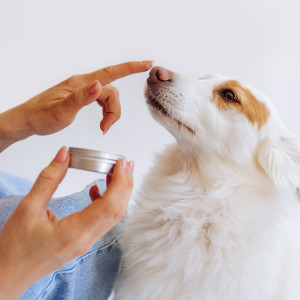Can I Put Coconut Oil on My Dog?
Plus, other alternatives that might be better.

Share Article
In This Article:
Benefits of Coconut Oil for Dogs Types of Coconut Oil for Dogs How to Apply Coconut Oil to Your Dog Frequently Asked Questions
Coconut oil has gained popularity as a natural remedy for various skin and coat issues in dogs. While many pet parents swear by its benefits, it’s essential to understand the proper use and potential drawbacks of applying coconut oil to your dog.
Potential benefits of coconut oil for dogs
If you follow enough health influencers, you’ve probably seen coconut oil promoted as a solution for weight loss, seizures, skin issues, and even dementia. But does it work the same magic for dogs? Unfortunately, scientific support for these effects in people remains poor, and evidence for the benefits of the use of coconut oil in dogs is even weaker. Despite this, there are some uses for coconut oil in dogs that have anecdotal support, may help, and are unlikely to cause harm.
So, why do people go cuckoo for coconut oil? Coconut oil is rich in certain types of medium-chain fatty acids (MCFAs) that bypass the normal way oils are processed during digestion. Instead, these lighter fatty acids are absorbed directly into intestinal cells and transported straight to the liver, where they can be used for energy. The purported benefits of coconut oil are often linked to the ability of MCFAs to be broken down into ketones that provide energy to cells, especially cells in the brain that usually rely on glucose.

Despite the potential benefits of MCFAs, coconut oil is still high in calories and contains a large amount of saturated fat — twice as much as lard, in fact. Just two tablespoons of coconut oil contains more than the recommended daily allowance of saturated fat for most people. Saturated fats are linked to arterial hardening, which is the primary cause of heart disease in humans. Dogs do not get the same type of heart problems as people, but they can still suffer adverse effects from increased fat consumption.
Because of its potential benefits, the use of coconut oil has been evaluated for a few canine diseases. Some suggested uses of coconut oil in dogs include:
Coconut oil for dry skin in dogs
Treating dry skin is likely the best use of coconut oil. Coconut oil has been shown to help skin retain moisture and elasticity in humans. Dogs aren’t just furry people though, and their skin has a different composition. There haven’t been studies on using coconut oil as a moisturizer in dogs, but it’s likely fine to spot treat dry areas with a thin layer of coconut oil.
Coconut oil for itchy skin on dogs
Parents of itchy dogs are always on the lookout for solutions to give their pups some relief. Unfortunately, coconut oil has not been evaluated for relieving itchiness in dogs. In humans, topical use of coconut oil has been shown to have mild anti-inflammatory and antibiotic properties when experimentally applied to cell cultures. It may be recommended as an adjunct preventative for people with eczema or atopic dermatitis because of this.
It’s possible that topical coconut oil could have some of the same benefits for dogs with allergic skin disease, but targeting the primary problem is still the key to successful treatment. Coconut oil does not have any of the omega-3 or omega-6 fatty acids shown to help with skin problems when given orally, so oral use for skin issues is not recommended.
Coconut oil on dogs’ paws
Using coconut oil for dry, cracked paws in dogs is tempting because the oil is easy to spread and has a pleasant smell. It’s unlikely to cause problems (except for slick feet and floors) unless your dog licks off an excessive amount. There are specific balms made for dog paws, and many contain coconut oil as one of their ingredients.
Coconut oil on dog hot spots
The use of coconut oil for hot spots in dogs is not recommended. Despite its potential anti-inflammatory and anti-bacterial properties, coconut oil should not be used to treat these localized infections. Hot spots are also called “moist dermatitis” and benefit from exposure to air. Other remedies for hot spots are more effective at treating this painful condition.
Coconut oil for fleas on dogs
Coconut oil does not kill fleas on dogs and is not an effective flea control strategy. Although your dog may enjoy running around like a greased pig, coating them with coconut oil is not going to help their flea problem. It’ll just make them ruin any furniture they come in contact with.
Coconut oil for weight loss in dogs
Coconut oil has been tested as part of a home cooked weight-loss diet in dogs. It didn’t help to speed up weight loss. Dogs fed a high-fiber, restricted-calorie diet incorporating coconut oil did lose weight, but this effect could not be separated out from the effect of calorie restriction. Because coconut oil is calorie dense, adding it to your dog’s normal diet will promote weight gain, not weight loss.
Coconut oil for seizures in dogs
A survey of pet parentsopens in new tab of dogs with epilepsy showed that coconut oil was commonly given as a dietary supplement to try to reduce seizure frequency. The theory is that the ketones from the breakdown of the MCFAs in coconut oil can help provide an alternative energy source for brain cells. Unfortunately, increased MCFA consumption has not been shown to reduce seizure frequency in animal epilepsy models, though it has not been evaluated in dogs specifically.
Types of coconut oil for dogs
Coconut oil comes in a variety of preparations. Like most oils that are high in saturated fat, it's solid at room temperature. Pure coconut oil melts at 78 degrees Fahrenheit (25.5 degrees Celsius). Virgin coconut oil is most commonly mentioned for use in dogs. This preparation uses a press to squeeze the oil out of fresh or dried coconut flesh.
Refined coconut oil is heated and filtered to remove odors and impurities. Partially hydrogenated coconut oil is treated in a way that converts its tiny amount of unsaturated fat into trans fats. This makes it more shelf stable, but less healthful.
How to apply coconut oil to your dog
Consult with your veterinarian before applying or feeding coconut oil to your dog. They know your dog’s health history and can inform you if there are any additional risks to giving your dog coconut oil. Depending on the problem you’re trying to treat with coconut oil, your vet may also have alternative, more effective therapies available.
Is coconut oil safe for dogs’ skin?
Although coconut oil seems harmless enough for topical use, a study did find that undiluted virgin coconut oil induced cell toxicity to experimental colonies of canine skin cells. The significance of this study is unclear because these cells did not have the normal protective mechanisms present in a living dog, but the study authors recommended against the use of undiluted virgin coconut oil on dogs’ skin.
Anecdotal use of coconut oil to treat areas of dry or itchy skin shows limited benefit, but no consistent problems or side effects have been reported. Your veterinarian may advise you to apply a thin layer for a short amount of time (less than an hour), then wipe away any residue.
Is coconut oil safe for dogs to eat?
Coconut oil is not directly toxic to dogs, but it can cause significant problems when ingested, due to its high-fat and calorie content. Many dogs don’t handle increased fat in their diet well and can develop issues, like diarrhea or pancreatitis due to this. Some dog breeds, like Schnauzers, have trouble processing triglycerides properly and are predisposed to pancreatitis; they are likely at increased risk of developing problems if fed coconut oil.
If your vet recommends adding coconut oil to your dog’s diet, start off with very small amounts and increase gradually until you reach the advised amount. Even a large dog shouldn’t be fed more than a teaspoon or so per day.
Can I rub coconut oil on my dog?
Coating your dog in coconut oil isn’t likely to help anything and may cause some harm. Dogs love to lick any perceived debris or contaminants off their coats, so rubbing a bunch of coconut oil on your dog leaves them at risk for severe stomach upset if they lick it off.
Can I leave coconut oil on my dog overnight?
When coconut oil is used topically, it’s generally recommended to apply it in a thin layer that can be absorbed quickly, then wipe away any remainder. Leaving coconut oil on overnight increases the chances your dog will lick it off, and extended contact could cause harm to skin cells if the skin’s normal protective mechanisms are broken down.
FAQs (People also ask):
How to help dry skin on dogs?
Dogs can develop dry skin for many reasons. Treating the underlying cause (whether it’s parasites or allergies) is the best way to help your dog’s skin. Your vet may recommend some topical therapies or oral supplements to keep your dog’s skin and coat healthy.
What are home remedies for dog skin diseases?
Depending on the cause of your dog’s skin disease, home treatments may include oral medications, bathing with a medicated shampoo, or topical ointments. Your veterinarian can help guide you on the best ways to keep your dog’s skin healthy at home.
References:

Dr. Bartley Harrison, DVM
Dr. Bartley Harrison is a veterinarian with more than 19 years of experience. He has treated a variety of species in emergency and speciality practices for both large and small animals. His primary interests as a vet are emergency medicine and critical care.
Related articles
What Can Dogs Drink Besides Water?
Good ol’ H2O should still be their top choice, but find out which alternatives are safe.
![Dog Looking Out The Window.]()
Dog Vision: What Do Dogs See?
Those soulful eyes mean everything to you—learn all about them.
Can Dogs Get Pimples? Causes, Symptoms, and Treatments
Time to go to the doggie dermatologist!
Can Dogs Get Colds?
We’re all sniffling this time of year. Learn if your pup can get a cold, too.
Can Dogs Get Sunburns? Signs, Treatment
It’s good to know ahead of all the summer fun you’re gonna have together.
Can Dogs Get Skin Tags? Causes and Treatments
Yes, and here’s why you shouldn’t pick at them, even if you want to.








